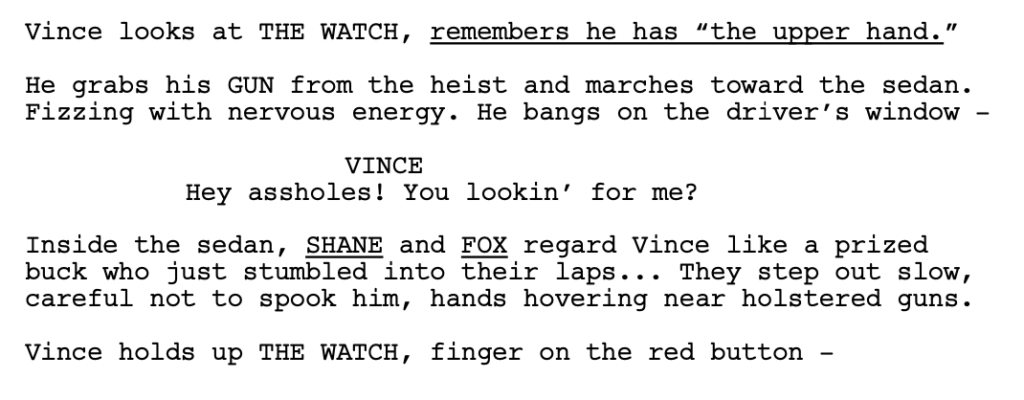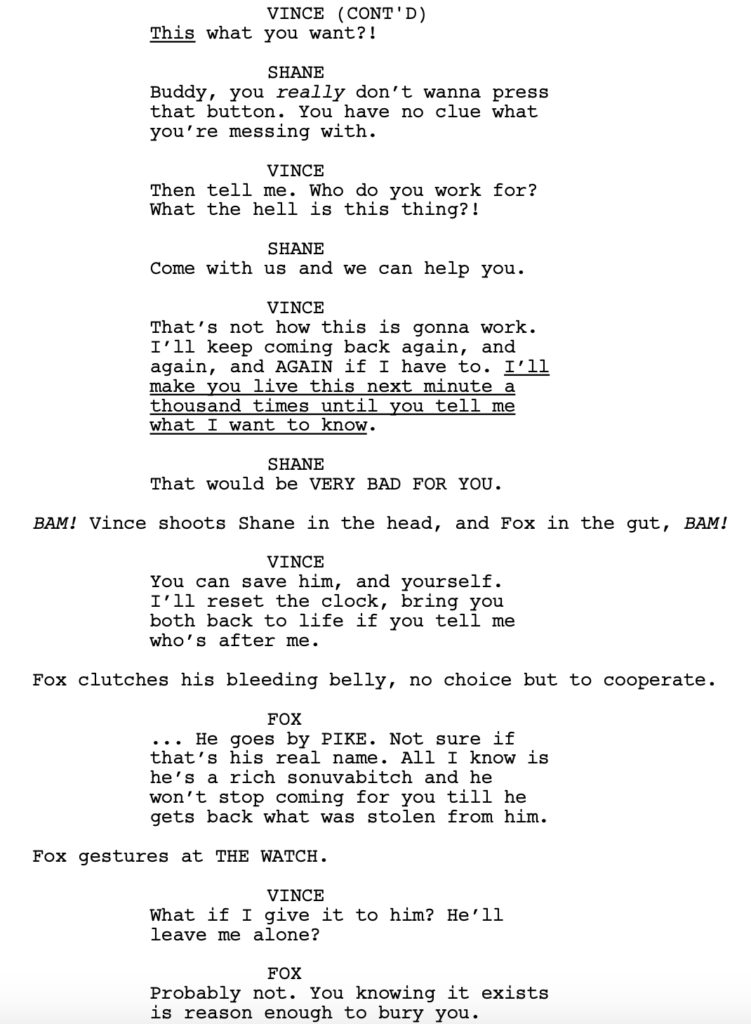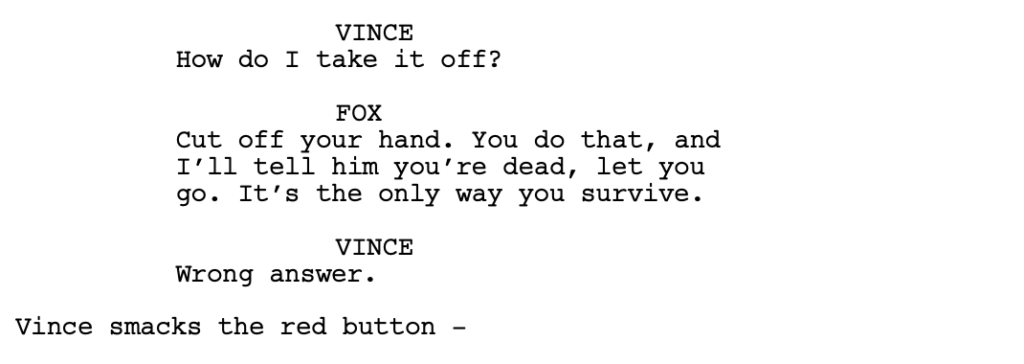Is today’s screenplay the spec script return of the slick high-concept sci-fi thriller?
Genre: Sci-Fi Thriller
Premise: A down-on-his-luck former getaway driver comes into possession of a mysterious watch that allows the user to go back in time by one minute. As he starts to uncover its uses and gets pulled into one last heist by his former crew, a dangerous group after the technology gets on his tail and will stop at nothing to get the watch back.
About: Today’s writer just got his first produced credit this year, with “Murder City.” “Undo” seems to cover similar ground… but with time travel! Simmons’s script finished on last year’s Black List.
Writer: Will Simmons
Details: 110 pages
 Michael B. Jordan and his cool shirt for Vince?
Michael B. Jordan and his cool shirt for Vince?
Thank Hootie and the Blowfish for this next tip. When it comes to writing high-concept stuff, one of your biggest allies is time. Time provides the key, not only to an unlimited number of high concept ideas, but to ideas that are cheap to produce, and therefore compelling to producers.
From going back in time to going forward in time to looping time to condensing time. There was that sci-fi script that sold to Amazon where future cops use a process of slowing down time by as much as 5000% at active crime scenes in order to take down the bad guys.
“Time why you punish me. Like a wave bashing into the shore. You wash away my dreams.” Poignant, Hootie. Poignant, indeed.
Vince is a former NASCAR driver. The only oil he changes these days is for his Toyota Prius to make sure he’s good to go for his next Uber drive. Yes, Vince is now an Uber driver. Sadly, the only joy he gets is in trying to find faster routes than the ones Google Maps assigns him.
Vince is perpetually late, which his girlfriend has had enough of. When he isn’t able to get her to her flight on time, she dumps him. While still at the airport, a scategorical Russian man named Gene lands in Vince’s car and gives him 300 bucks cash to “drive.”
Not long after they leave the airport, a truck starts bashing Vince’s poor Prius. A man in the truck pulls a gun and shoots Vince dead. But then Gene presses a button on a special watch he’s wearing and we go back in time 60 seconds. This time Gene is able to warn Vince about the gun, which helps Vince survive.
But only temporarily. The truck collides with the Prius again, badly injuring Gene. With his dying breath, he takes the special watch off, puts it on Vince’s wrist (where it locks onto him), and tells Vince to “find Anna.” Gene dies and Vince slams his petal to the metal.
Vince is able to get to his old criminal buddy, Benji’s, house. Benji will allow him to store the car with the dead body here only if Vince agrees to be the wheelman in Benji’s next Brink’s truck heist. Vince reluctantly agrees (what choice does he have?) And off they go. But the heist is a setup. The entire car full of Benji’s team is slaughtered. Except that Vince is able to reverse time and escape.
Benji is now freaked out and kicks Vince out of his home. That’s when Vince realizes, “Wait a minute, I control time!” So he goes to the nearest casino and starts racking up cash. It’s there where he meets Pike, the guy who funded Gene’s research. Pike wants that watch back. And he’ll do anything to get it. Can Vince use the one ace up his sleeve (1 minute rewinds) to escape Pike? Or is Vince in way over his head?
“Undo” is a script I would’ve written when I first started screenwriting.
It’s so far in my lane that I may as well be using Bentley-level cruise control.
But Simmons makes some of the same mistakes I used to make with these scripts, the first of which is being too casual with the execution.
Any time you’re asking the reader to accept a fake reality that you’ve created, you run the risk of them not buying what you’re selling. Usually, what does you in, is being too casual with the execution.
Take, for example, a scene from the first act where Benji recruits Vince to be the driver in his latest heist. When the rest of the crew shows up, one of them says, wow, we’re so lucky. Vince is the best wheelman in the world.
IN THE WORLD!
That’s a pretty big statement, right?
Except that four scenes earlier, we watched Vince RUN OUT OF GAS while trying to get his girlfriend to the airport. I don’t know much about being a getaway driver. But I’m pretty sure that if I was a good getaway driver, one of the things I’d probably monitor is THE GAS!!!!!
That was a minor thing though.
This next one was major.
Benji initially freaks out when Vince shows up with a dead guy in his car. Benji wants to know how long ago Vince lost his tail so that he can be sure no one’s followed him here. Vince tells him it was miles ago, he’s clear, and so Benji lets him in.
They then start doing research on Gene (the dead guy) and find out he’s FORMER KGB!!!! What’s Benji’s reaction to this? He shrugs his shoulders. Hmm, that’s interesting. Doesn’t bat an eye.
Let me think out loud here for a second. A minute ago, Benji was worried about some second-tier street thug maybe following Vince and figuring out where Benji lives. But Benji has no problems with a DEAD KGB AGENT IN HIS HOME?????!!! I’m thinking on the scale of “this is a problem,” that’s about a million times worse than a Latin King.
When the writer doesn’t consider these things, it bothers me. Because it tells me he’s not really living in the world of his screenplay. He’s more concerned with moving the plot along. It’s too casual. And casual execution kills.
The real reason people are coming to see this movie, though, is to see it deliver on the promise of its premise. Do we get cool “can’t see’em in any other movie” sequences involving this one-minute time jump?
I would say the script does okay in this department. I’m always looking for those 2-3 scenes that really knock it out of the park – scenes that I could never have thought of in a million years. Cause that’s when you know the writer is really dialed into his premise. He’s seeing it in ways nobody else sees it.
Which should be the case for every script ever written. The writer should be so entrenched in his idea, that he’s already thought of the 30 different scenes that the average writer would’ve thought up regarding the 1-minute time jump and not used any. Because he’s going deeper. He’s going to give you the stuff nobody would’ve thought of.
There’s a scene in the second act where Vince charges up on two of Pike’s guys sitting outside of his home, catching them off-guard. Vince still doesn’t know the rules of this world yet or what’s going on.



To me, this was the best exploration of the premise in the script. It felt like we were genuinely using the 1 minute time loop in a clever way.
But after that, all the uses of the loop were expected, which basically boils down to a bunch of times where Vince is dying after getting shot and then getting one more minute back. There was one other interesting scenario where Vince was getting attacked on all sides, wherever he ran, so he barely escapes a gun to his head, gets outside, gets nearly killed there as well, and he has to make a decision because, if he goes back in time one minute, it will be where the guy has a gun to his head. So he’s dead either way.
THAT stuff I like. Because any time you give your character a choice where both options are bad, audiences are interested in seeing which one he chooses.
I know I’m beating a dead horse here but the way that you separate yourself from the pack is not to take a fun premise and execute it averagely. Or slightly above-average. The way to separate yourself is to do the hard work and really come up with the kind of execution that knocks the reader out. Makes them say, ‘Whoa’ every ten pages, a la Keanu Reeves. I never got the sense that Simmons gave me everything he had. So even though this was a decent script, it wasn’t for me.
[ ] What the hell did I just read?
[x] wasn’t for me
[ ] worth the read
[ ] impressive
[ ] genius
What I learned: A scene that will always work is to give your character a choice where both options are bad. The higher the stakes of the choice, the more compelling the scenario will be. Too many writers give their characters choices where there’s a good choice and a bad choice. How interesting is that? If we know what the character is going to choose, you haven’t made both options bad enough. You want to create the kind of choice where *you’re* not even sure which option you would choose.

